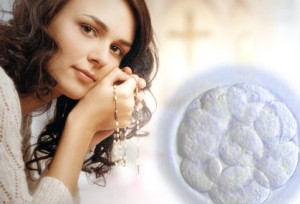Why the Catholic Debate Over the Morality of Saving Frozen Embryos Misses Some Important Points

By Dr. Craig R. Sweet
Medical & Practice Director
Founder, Embryo Donation International
I have welcomed and watched for some time the debate within the Catholic Church about the appropriateness of Catholics “saving” frozen embryos, which is a discussion that has seen a recent resurgence. I admire both sides of the debate: those who are interpreting steadfastly the teachings of the Church regarding in vitro fertilization, as well as those good people who want to give frozen embryos a chance of life.
Didn’t the Vatican’s Dignatias Personae settle the moral issue?
The 2008 Vatican document Dignatias Personae (The Dignity of a Person), which was intended to provide updated directives on biomedical ethical controversies, may not have settled this moral issue to the satisfaction of all. Because the Catholic Church believes in unconditional respect for all human life from the moment of conception, to some, these teachings seem to be at odds with Catholics who want to save frozen embryos. Both sides, however, are missing an important point.
 Why some believe embryo donation/adoption is morally wrong.
Why some believe embryo donation/adoption is morally wrong.
Let’s start with the perspective from those who feel it is morally wrong for Catholics to participate in IVF, embryo donation or embryo adoption. While not an expert in any aspects of Catholic theology, I will try to list what I believe are the important talking points:
- The Catholic Church feels IVF separates conception from the immediate act of sexual union between spouses while also improperly treating life as a commodity. IVF, therefore, is morally wrong and using fresh or frozen embryos created from such an act cannot be condoned or justified.
- A husband has a spousal right within the marital bond to his wife’s body and no one but the husband should impregnate his wife. In mutual respect, their bodies belong to each other and no other.
- Gestational surrogacy with donated/adopted embryos violates the covenant of marriage, as these pregnancies are not conceived through a natural act of conjugal love.
Some believe that IVF is morally wrong so using frozen embryos created via IVF cannot be justified.
Why some believe receiving a donated/adopted embryo is morally correct.
Next, let me next provide some of the arguments from those who feel that receiving donated embryos or gestating adopted embryos is morally correct:
- Keeping the embryos frozen indefinitely is an ongoing injustice and affront to the embryo’s dignity.
- Accepting donated/adopted embryos is similar to the adoption of a child, which is certainly encouraged by the church. Think of it as a “prenatal adoption”.
- A women who adopts and is able to breast feed a child, which is allowed by the Church, is providing nourishment. One can then surmise that carrying a donated/adopted embryo in the womb, thereby providing nourishment is no different.
- Surrogacy, under extreme circumstances, may be morally correct when a woman or the child would be severely harmed if the woman tried to carry and deliver a pregnancy.
- Pregnancy occurs without having sex with another, so the marital bond remains intact.
- Rescuing and receiving embryos ultimately protects the sanctity of life.
Others believe that life is sacred and that Catholics should be allowed to save frozen embryos.
Simply stated, those that believe it is immoral to receive donated/adopted embryos do not feel the ends justify the means when the means used, i.e., in vitro fertilization, is considered immoral. Those who believe gestating a donated/adopted embryo is moral ultimately feel the ends justify the means when the ends result in “saving” frozen embryos and building a happy family. This dilemma has divided a number of devout Catholics onto different sides of the debate.
What points are being missed in the debate?
Those against embryo donation/adoption also fear that the IVF industry will boom trying to resupply embryos. Nothing could be further from the truth. Frozen embryos are donated reluctantly with fewer than 10% donated to patients in need. Patients create embryos to build families of their own, not with the intent to donate or adopt. A boom will never materialize and is not a realistic concern.
Some also are concerned that embryos would be created and sold to the highest bidder. Embryos must always be created with patients in mind. If not, we could potentially have banks of unclaimed embryos, created from both donor eggs and donor sperm waiting to be chosen. Potential human life is never to be bought or sold or should be left unclaimed waiting somewhere in a liquid nitrogen tank. The creation and sale of embryos is clearly, no matter what your religion, ethically inappropriate and utterly unacceptable.
One could also argue that fertile Catholics, with potentially large families, shouldn’t have priority to the donated embryos over infertile couples who have never had a family. I can tell you this is an important point to hopeful embryo recipients who are desperately searching for the limited number of donated embryos and a chance to even have a single child.
What is the most important point I feel is being missed in the Catholic debate?
While it is wonderful to watch the Catholic Church discuss these issues in ways it has not done before, the truth is that they don’t need to have such angst. The unfortunate reality is that the number of potential (non-Catholic) recipients far outstrips the number of embryos available. Frozen embryos, which are not used by those that created them, don’t need to be saved; they simply need to be donated. There are literally thousands of recipients that will gladly take them without reservation. Nearly all donated embryos will find a home without good Catholics having to wrestle with this difficult moral decision.
I truly appreciate the conversation that wonderful Catholics have had within their Church regarding this issue. I have nothing but respect for those that are discussing their concerns. The sad truth is, however, that it is a moot point. From a practical perspective, we simply don’t have enough donated embryos to meet the current needs of the recipients who do not feel morally conflicted about the issue and who are not at risk from repercussions from a Church that maintains strong convictions. Perhaps if we significantly increase the number of embryos donated by decreasing the number abandoned or discarded, there would be a surplus of donated embryos and we would indeed need Catholics to rekindle the discussion.
To the good Catholics who are wrestling with this issue, feel free to keep the conversation going but be aware your participation, however welcome, thoughtful and well intended, is truly not needed to save the embryos you hold so dear. They are already spoken for.
Craig R. Sweet, M.D.
Reproductive Endocrinologist
Founder, Medical & Practice Director
Embryo Donation International
Info@EmbryoDonation.com
www.EmbryoDonation.com
References:
Gilbert, Kathleen. “Top Catholic Ethicists Duel over Frozen Embryo Adoption.” LifeSiteNews.com, US Edition. LifeSiteNews.com, 02 Aug. 2011. Web. 06 Aug. 2011. <http://www.lifesitenews.com/news/top-catholic-ethicists-duel-over-frozen-embryo-adoption>.
“Dignitas Personae (The Dignity of a Person).” United States Conference of Catholic Bishops. Department of Communications, United States Conference of Catholic Bishops. Web. 05 Aug. 2011. <http://www.usccb.org/comm/Dignitaspersonae/>.
[English/Spanish translations with other excellent pdf files]
Napier, Ph.D., Stephen, and John M. Hass, Ph.D., S.T.L. “Commentary on Dignitas Personae – The National Catholic Bioethics Center.” Home Page – The National Catholic Bioethics Center. The National Catholic Bioethics Center. Web. 03 Aug. 2011. <http://www.ncbcenter.org/page.aspx?pid=1010>.
Oleson C. Digitas personae and the Question of Heterologous Embryo Transfer. The Linacre Quarterly 2009;76(2):133-149.
My husband and I eagerly await our opportunity to receive an embryo via frozen transfer. I grew up Catholic and though I respect this religion, do not participate often in religious events. I feel that a spiritual person that believes in God should be able to worship HIm however they feel fit. Regardless of what religion is observed, I believe there should always be options for extenuating circumstances. I do not believe that it is God’s will if we have a child. If that were the case, there would not be assisted reproductive options available. I also believe women should have a say what happens to their own bodies and when this right is taken away, it IS a violation of their rights. There is no religion with the “right” views, only views that are right for each individual family. I hope the Catholic church will become more accepting of individual’s rights and choices in their own lives. Shouldn’t saving children be considered an obligation for every religion?
You seem to have struck a balance. Wanting to believe in your religion but placing it in the perspective with today’s possibilities.
I think your perspective on there being no religion with the “right” views but only views that are right to each individual and family is spot on. I truly wish this view was a bit more pervasive and accepted. Perhaps there would be less violence, wars and death in the name of religion.
I truly wish you all the best in building your family, in whatever method the two of you choose. Great luck to both of you.
CRS
===
Craig R. Sweet, M.D.
Reproductive Endocrinologist
Founder, Medical and Practice Director
Embryo Donation International